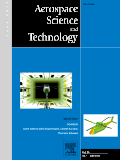
Aerospace Science and Technology
Scope & Guideline
Exploring the Frontiers of Aerospace Technology
Introduction
Aims and Scopes
- Aerodynamic Analysis and Optimization:
Research focused on improving aerodynamic performance through innovative design techniques, computational fluid dynamics, and experimental validation of aircraft components. - Control Systems and Guidance:
Development of advanced control methodologies for aerospace vehicles, including fault-tolerant systems, adaptive controllers, and guidance laws for various flight conditions. - Propulsion and Combustion Studies:
Investigations into combustion mechanisms, efficiency improvements in propulsion systems, and the effects of various fuels and combustion strategies on performance. - Structural Integrity and Material Science:
Exploration of new materials and structural designs to enhance the performance and durability of aerospace components, including analyses of impact resistance and fatigue. - Multi-disciplinary Approaches:
Integration of various engineering disciplines, such as fluid dynamics, structural engineering, and control theory, to address complex aerospace challenges. - Unmanned Aerial Systems (UAS) and Autonomous Vehicles:
Research on the design, control, and operational strategies for autonomous aerial vehicles, including UAVs and eVTOLs, focusing on safety, efficiency, and adaptability.
Trending and Emerging
- Artificial Intelligence and Machine Learning Applications:
The integration of AI and machine learning in aerodynamics, control systems, and predictive maintenance is rapidly growing, showcasing their potential to optimize performance and operational efficiency. - Sustainable Aviation Technologies:
Research focused on sustainable materials, energy-efficient propulsion systems, and environmentally friendly practices is gaining traction, driven by global efforts to reduce the carbon footprint of aviation. - Advanced Materials and Manufacturing Techniques:
Emerging interest in the development of advanced composite materials, additive manufacturing, and their applications in aerospace design is on the rise, emphasizing lightweight structures and enhanced performance. - Dynamic Flight Control Systems:
Research into dynamic and adaptive control systems that can respond to real-time changes in flight conditions is increasingly prevalent, particularly for unmanned systems and autonomous vehicles. - Hypersonic and Supersonic Flow Research:
The exploration of hypersonic and supersonic aerodynamics, including innovative designs and testing methodologies, has gained importance due to advancements in aerospace technology and the interest in high-speed travel.
Declining or Waning
- Conventional Aerodynamics:
Traditional aerodynamic studies, particularly those focusing solely on subsonic flows without considering new technologies or advanced modeling techniques, have seen reduced attention. - Static Testing Methods:
Research relying heavily on static testing methods has diminished as more dynamic and computational approaches become prevalent, allowing for more realistic simulations. - Single-Disciplinary Research:
There is a waning interest in research that does not integrate multiple disciplines, as the complexity of modern aerospace challenges necessitates multi-disciplinary collaboration. - Basic Propulsion Studies:
Research focused on conventional propulsion mechanisms without innovative advancements or hybrid systems has become less frequent, as the industry shifts towards more sustainable and efficient solutions. - Simplistic Control Techniques:
Basic control techniques that do not incorporate adaptive or intelligent systems are becoming less relevant, as the demand for sophisticated, responsive control systems increases.
Similar Journals
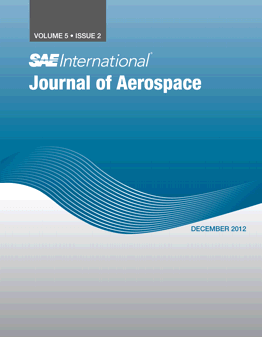
SAE International Journal of Aerospace
Shaping the Future of Aerospace Knowledge.The SAE International Journal of Aerospace, published by SAE International, serves as a critical platform for innovative research and advancements within the field of aerospace engineering. With an ISSN of 1946-3855 and an E-ISSN of 1946-3901, this esteemed journal contributes significantly to the body of knowledge in the aerospace sector, boasting a convergence span from 2008 to 2024. While currently categorized in Q4 of Aerospace Engineering, the journal is dedicated to fostering emerging ideas, technologies, and methodologies that could eventually elevate its standing. Although it does not offer open access options, the journal ensures wide dissemination of its well-curated articles to aid researchers, professionals, and students in staying abreast of the latest developments and trends. Given its distinct focus and commitment to the aerospace community, the SAE International Journal of Aerospace plays an essential role in bridging theory and practice, making it a valuable resource for those within this vital and evolving field.
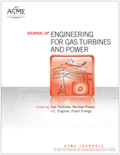
JOURNAL OF ENGINEERING FOR GAS TURBINES AND POWER-TRANSACTIONS OF THE ASME
Connecting Academia and Industry in Energy InnovationJournal of Engineering for Gas Turbines and Power - Transactions of the ASME, published by the esteemed American Society of Mechanical Engineers (ASME), is a leading interdisciplinary journal dedicated to advancing the fields of energy engineering, aerospace, nuclear energy, and mechanical engineering. With an impressive history dating back to 1960 and continuing its contributions through 2024, this journal boasts a Q2 ranking in multiple engineering categories, reflecting its strong impact on both academia and industry. Although not an open-access journal, it provides invaluable insights and research findings that cater to the needs of professionals, researchers, and students alike. The journal's ISSN is 0742-4795 with an E-ISSN of 1528-8919, ensuring widespread visibility in the global academic community. Indexed in Scopus, it ranks notably within its fields—21st in Nuclear Energy and Engineering and 51st in Aerospace Engineering—underscoring its relevance and contribution to critical technological advancements. Researchers in this domain will find the journal a vital resource for innovative studies, practical applications, and the latest developments related to gas turbines and power generation.

Journal of Aerospace Information Systems
Pioneering Research for Tomorrow's Aerospace ChallengesJournal of Aerospace Information Systems, published by the American Institute of Aeronautics and Astronautics, is a premier scholarly platform dedicated to advancing the interdisciplinary field of aerospace information systems. With a focus on innovative research and practical applications, this journal supports the dynamic integration of aerospace engineering, computer science, and electrical engineering. Positioned in Q2 quartiles for 2023 in its respective categories, it ranks notably in Aerospace Engineering (#52/153) and Electrical and Electronic Engineering (#357/797), indicating its significant influence within the scientific community. Research published within its pages addresses a diverse range of technological advancements and applications that are vital for the development of contemporary aerospace systems. As an open-access journal, it facilitates broader dissemination of knowledge, allowing researchers, professionals, and students to engage with cutting-edge discoveries and methodologies. With its competitive impact and commitment to fostering innovation, the Journal of Aerospace Information Systems is an essential resource for anyone involved in the burgeoning field of aerospace technology.

Drone Systems and Applications
Transforming Ideas into Aerial SolutionsDrone Systems and Applications is an innovative open-access journal published by Canadian Science Publishing that commenced its journey in 2022 and is set to converge in 2024. With a keen focus on the interdisciplinary domains of Aerospace Engineering, Automotive Engineering, Control and Optimization, and Computer Science Applications, this journal seeks to advance the frontiers of knowledge surrounding drone technology and its myriad applications. Achieving notable rankings within various engineering and computer science categories, including being placed in the Q2 quartile in Automotive Engineering and Q3 quartiles in several other relevant fields, the journal exemplifies scholarly excellence and research impact. As an open-access publication, it ensures that cutting-edge research is readily available to a global audience, fostering progress in drone systems across multiple industries. For researchers, professionals, and students alike, Drone Systems and Applications serves as a vital platform for disseminating impactful findings and promoting collaborative advancements in this rapidly evolving field.

International Journal of Aeronautical and Space Sciences
Pioneering Insights in Aerospace EngineeringThe International Journal of Aeronautical and Space Sciences, published by Springer, is a prominent platform dedicated to advancing research and innovation in the fields of Aerospace Engineering, Control and Systems Engineering, Electrical and Electronic Engineering, and Materials Science. With an ISSN of 2093-274X and an E-ISSN of 2093-2480, the journal has established itself as a vital resource since its inception in 2011, currently offering insights that span a wide range of contemporary challenges and technological advancements in aeronautics and space exploration. Ranking in the Q2 category across multiple disciplines, including Aerospace and Control Engineering, signifies its recognized impact and quality within the academic community. Although not an open-access journal, it remains accessible to researchers, professionals, and students seeking to enhance their understanding of complex aerospace systems and their applications. The journal’s commitment to publishing high-quality research makes it indispensable for those aiming to contribute to, or stay informed about, the evolving landscape of aerospace technology.

Journal of the Global Power and Propulsion Society
Advancing Innovation in Power and Propulsion TechnologiesJournal of the Global Power and Propulsion Society, published by GLOBAL POWER PROPULSION SOC, is a premier open-access journal established in 2017, dedicated to the dissemination of innovative research and advancements in the fields of aerospace engineering, industrial and manufacturing engineering, and mechanical engineering. Based in Zug, Switzerland, this journal provides a critical platform for researchers, professionals, and students to engage with cutting-edge studies and emerging technologies that are pivotal to the aerospace and propulsion sectors. With an impressive categorization in the Q2 quartile for multiple engineering specialties in 2023, the journal reflects its commitment to quality and rigor in its peer-reviewed articles. Moreover, it holds substantial visibility in the academic community, as evidenced by its Scopus rankings. The Journal of the Global Power and Propulsion Society stands at the intersection of innovation and collaboration, aiming to foster knowledge sharing globally while enhancing the operational capabilities of power and propulsion technologies.
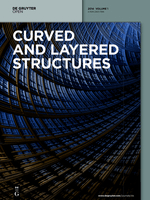
Curved and Layered Structures
Pioneering Research in Structural ComplexityCurved and Layered Structures, published by DE GRUYTER POLAND SP Z O O, is a distinguished open-access journal that has been an essential platform since 2014 for academics and professionals in the fields of Aerospace Engineering, Architecture, Building and Construction, Civil and Structural Engineering, and Computational Mechanics. With an ISSN of 2353-7396, it is recognized for its impactful contributions, reflected in its impressive category quartiles, particularly Q1 in Architecture and notable rankings in various engineering disciplines. The journal's scope encompasses innovative research focusing on the intricate designs and applications of curved and layered structures, making it pivotal for advancing knowledge in these areas. The open-access format ensures widespread dissemination of research findings, promoting accessibility and collaboration among researchers and practitioners worldwide. As it navigates its converged years from 2014 to 2024, Curved and Layered Structures continues to attract high-quality submissions that push the boundaries of engineering and architectural design.
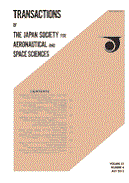
TRANSACTIONS OF THE JAPAN SOCIETY FOR AERONAUTICAL AND SPACE SCIENCES
Unveiling the Mysteries of Space and EngineeringTRANSACTIONS OF THE JAPAN SOCIETY FOR AERONAUTICAL AND SPACE SCIENCES is a distinguished journal published by the Japan Society for Aeronautical and Space Sciences, focusing on the latest advancements and research in the fields of aerospace engineering and space and planetary science. With a broad range covering theoretical studies, practical applications, and experimental research, this journal serves as a vital platform for researchers, professionals, and students keen to explore the intricacies of aeronautics and space technologies. Although currently closed to open access, the journal maintains a significant presence in the academic community, boasting a 2023 Scopus ranking of Q3 in both of its respective fields and offering insights that contribute to ongoing discussions and innovations in aerospace. Since its inception in 1969 and with publications extending to 2024, the journal not only reflects the evolving landscape of aeronautics and space sciences but also encourages discourse that paves the way for future breakthroughs. For your engagement and contributions to this dynamic field, the TRANSACTIONS OF THE JAPAN SOCIETY FOR AERONAUTICAL AND SPACE SCIENCES stands as an essential resource.

Journal of the Korean Society for Aeronautical and Space Sciences
Advancing Global Collaboration in AeronauticsThe Journal of the Korean Society for Aeronautical and Space Sciences is a dedicated platform for the dissemination of cutting-edge research in the fields of aerospace engineering and space sciences. Published by the esteemed Korean Society for Aeronautical & Space Sciences, this journal aims to bring together innovative findings and technological advancements from around the globe, thereby contributing to the ongoing development of the aerospace sector. Operating from South Korea, the journal holds an ISSN of 1225-1348 and an E-ISSN of 2287-6871, catering to both print and digital scholarly communication. Although categorized in Q4 within the Aerospace Engineering segment and ranked 139 out of 153 on Scopus, the journal plays a crucial role in fostering research collaboration and knowledge exchange among professionals, researchers, and students alike. With converged years from 2019 to 2024, it continuously seeks to enhance its contributions to the academic community through rigorous peer review and publication of original research. Given the evolution of aerospace technologies, this journal is vital for anyone involved in aeronautical research, ensuring that their work reaches the right audience.
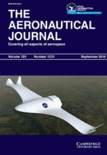
AERONAUTICAL JOURNAL
Advancing aerospace knowledge since 1969.Aeronautical Journal, published by Cambridge University Press, is a premier scholarly journal dedicated to advancing the field of aerospace engineering. With a notable impact factor, this journal holds a strong position in the academic community, ranked #53 out of 153 in the Scopus category of Aerospace Engineering, placing it in the 65th percentile. The journal has been providing a platform for groundbreaking research since its inception in 1969, and continues to be a vital resource for researchers, professionals, and students involved in aeronautics. As a Q2 journal in the 2023 Aerospace Engineering category, it offers high-quality articles that cover a range of topics within the discipline, contributing to the ongoing discourse and innovation in aerospace technologies. Although not an open-access journal, it remains accessible to a vast readership through institutional subscriptions and partnerships. The Aeronautical Journal is a crucial publication for those seeking to stay at the forefront of aerospace research and development.